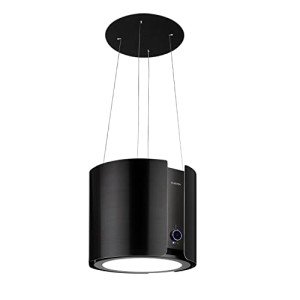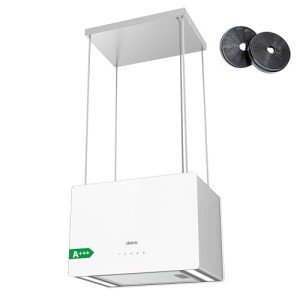Island Extractor Hoods Tools To Improve Your Everyday Lifethe Only Isl…
페이지 정보
작성자 Marti 댓글 0건 조회 3회 작성일 25-05-21 10:15본문
Island Extractor Hoods: The Ultimate Guide to Choosing and Maintaining Your Kitchen's Ventilation System
In modern cooking areas, an island extractor hood is not simply a practical necessity, it likewise acts as a centerpiece that enhances the aesthetic of the space. As open-concept living environments continue to increase in appeal, understanding the functions, advantages, and maintenance of island cooker hood extractor hoods becomes crucial for property owners. This article will look into the various aspects of island extractor hoods, helping readers make notified choices based upon their kitchen requires.
What Are Island Extractor Hoods?
Island extractor hoods are ventilation systems developed to be mounted above kitchen islands, guaranteeing effective air purification while blending perfectly with the kitchen's style. Unlike traditional range hoods that are normally installed against a wall, island island extractor hoods hoods are suspended from the ceiling, which offers more flexibility in kitchen designs.
The primary function of an island extractor hood is to get rid of airborne grease, smoke, steam, and odors generated during cooking, thus improving indoor air quality. This is particularly essential in open-concept homes where the kitchen is integrated into the living area.
Benefits of Island Extractor Hoods
There are many benefits to installing an island cooker hoods 60cm extractor hood in your kitchen:
Improved Air Quality: They filter and expel toxins, making sure a much healthier cooking environment.
Design Flexibility: Available in various sizes, styles, and surfaces, they can complement any kitchen style.
Boosted Lighting: Many designs come equipped with incorporated lighting, illuminating the cooking surface below.
Noise Reduction: Modern designs are developed to operate silently, decreasing disturbances in an open-concept layout.
Improved Home Value: A well-chosen island hood can increase the aesthetic and functional appeal of a kitchen, therefore boosting home worth.
Secret Features to Consider
When selecting an island extractor fan for island hob hood, several features need to be taken into consideration:
| Feature | Description |
|---|---|
| Size | Choose a hood that is equivalent to or somewhat larger than the cooking surface area dimension. |
| Extraction Rate | Determined in CFM (cubic feet per minute), this rate suggests just how much air the hood can move. |
| Purification Type | Choices consist of ducted (vented) and ductless (non-vented) systems, depending upon home design and choices. |
| Control Type | Consider easy to use controls; alternatives consist of mechanical buttons, touch controls, or remote controls. |
| Noise Level | Inspect the sone score; lower scores show quieter operation, essential for open areas. |
| Lighting | Look for models with integrated LED lights for boosted visibility while cooking. |
Setup Types
There are three main setup types you can choose from for island extractor hoods:
Ducted Hoods: These utilize ductwork to expel air outside the home. They are generally more efficient but need a more intricate setup process.
Ductless Hoods: These recirculate filtered air back into the kitchen. They are easier to set up but might need more regular filter replacements.
Convertible Hoods: This type can be adapted to run as either ducted or ductless, supplying versatility based on the house owner's requirements.
Frequently Asked Questions About Island Extractor Hoods
What is the perfect height to install an island extractor hood?
The perfect height for installation is generally 30-36 inches above the cooking surface. However, this could vary depending upon the particular design and the user's height.
How do I tidy and preserve my island extractor hood?
Routine maintenance is vital for optimum efficiency.
- Tidy the exterior utilizing a mild soap option and a soft fabric.
- Replace or clean filters as advised by the maker.
- Guarantee the ducting system is clear of blockages if using a ducted model.
How typically should I change the filters?
For ductless hoods, charcoal filters ought to ideally be changed every 6 to 12 months, while grease filters might require more regular cleansing, such as every 2-4 weeks, depending upon usage.
Are island extractor hoods energy-efficient?
Many models are created with energy-efficient motors and LED lighting alternatives. Try to find products that boast ENERGY STAR accreditations or similar rankings.
Can I set up an island extractor hood myself?
While some might choose to carry out the setup, it's advised to work with an expert, particularly for ducted systems, to guarantee safety and correct fitting.
Maintenance Tips for Island Extractor Hoods
To ensure longevity and performance, consider the following upkeep practices:
Regular Cleaning: Clean grease filters, baffle filters, and the exterior surface area regular monthly to prevent accumulation.
Check Ductwork: Inspect duct systems for blockages or damage every six months, ensuring optimal air flow.
Replace Filters: Follow producer guidelines for changing or cleaning up filters to preserve air quality.

Monitor Performance: If you discover minimized airflow or increased sound, it might be time to speak with an expert for repair or servicing.
Island extractor hoods have actually evolved considerably, offering sophisticated functions and abilities that not just improve kitchen efficiency however also elevate home looks. By thoroughly considering size, filtering type, and setup preferences, property owners can pick the perfect island hood for their requirements. Regular upkeep guarantees efficiency and sturdiness, making this kitchen appliance a valuable financial investment for any family. Whether updating an existing hood or setting up a new one, comprehending these systems is essential for achieving a functional and trendy kitchen environment.

댓글목록
등록된 댓글이 없습니다.